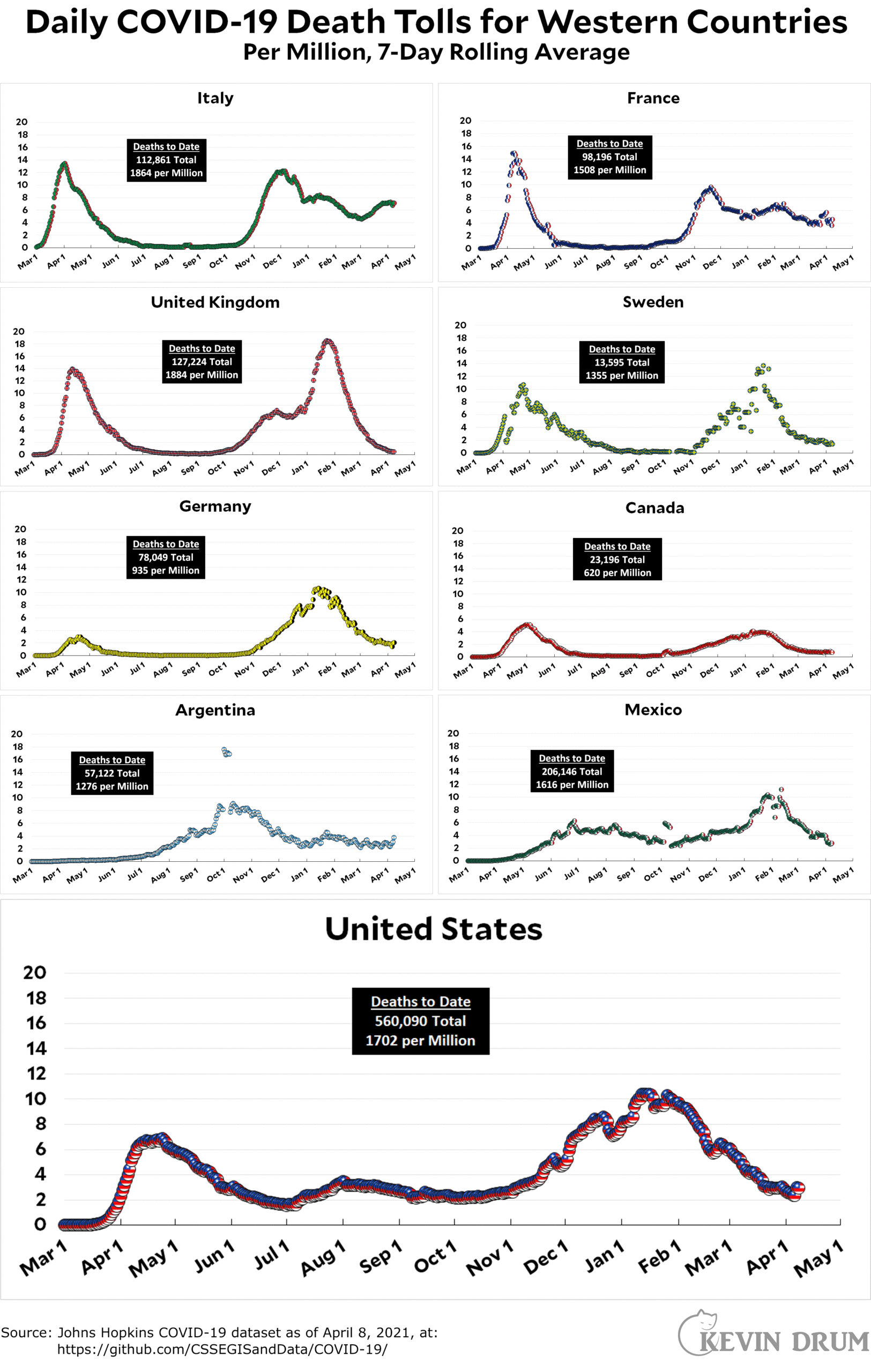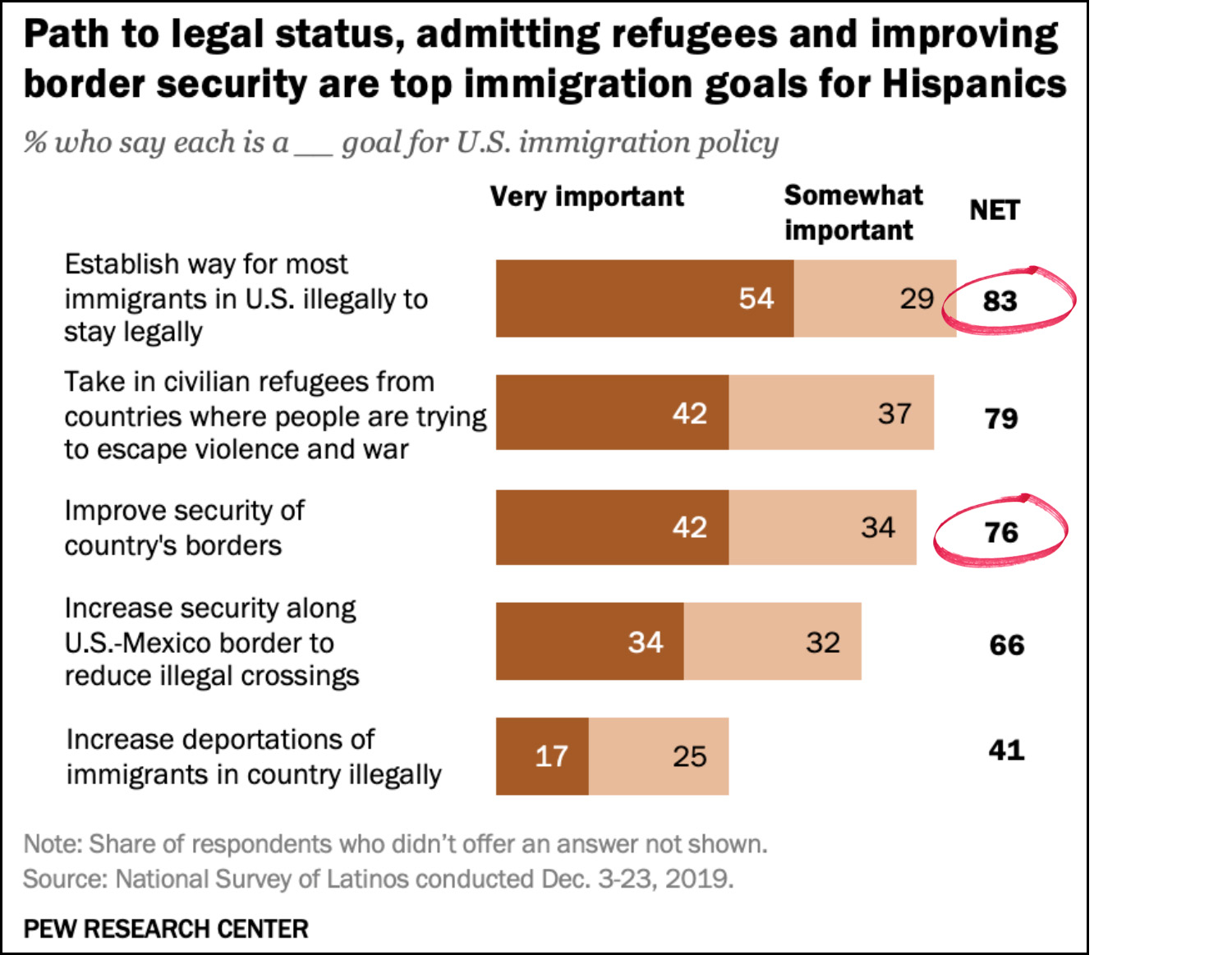Here’s the officially reported coronavirus death toll through April 8. The raw data from Johns Hopkins is here.

Cats, charts, and politics

Here’s the officially reported coronavirus death toll through April 8. The raw data from Johns Hopkins is here.

This originally popped up on the internet a year ago, but I only heard about it today:
Fun fact: some people have an internal narrative and some don't
As in, some people's thoughts are like sentences they "hear", and some people just have abstract non-verbal thoughts, and have to consciously verbalize them
And most people aren't aware of the other type of person
— Kyle ???? (@KylePlantEmoji) January 27, 2020
The fuck? I have no idea what it could be like not to have an interior monologue. Mine is more or less active 24/7 and practically every substantial action I take is the result of some kind of internal debate with myself. If I didn't have that going, how would I even think?
In any case, this is apparently for real:
Russell Hurlburt, a psychology professor at the University of Nevada, has been studying what he calls inner experience for more than 40 years. "It's the most interesting topic on the planet," he said.
He has written six books on it and worked with hundreds of participants. He gives them each a beeper and when it goes off at random times throughout the day, they have to note what's going on in their minds. He said people generally think in five ways. Some people experience them all.
This got me curious. Supposedly about one person in five has no interior monologue, so I started calling friends and family. On my seventh try I found a friend who doesn't experience thought that way. We talked for a bit, but it was sort of like describing sight to a blind person. If you don't think in words, then how do you think? He tried to describe it, but wasn't really able to.
This literally changes my view of what it means to be human. I'm not sure what to make of it, but I plan to read more about it and report back.
There are times when I think I must be going crazy. But I'm not. It really is other people most of the time. Consider this piece at the Monkey Cage that uses an Arkansas transgender bill as a springboard to ask a broader question:
But why does the U.S. segregate sports — or administer healthcare — by sex in the first place? In my research and consulting work, I examine how gender options are presented to Americans on forms and in policies, and how this “choice architecture” — a term taken from behavioral economics — nudges us to think about our own and others’ gender in particular ways.
Huh. The reason for segregating sports by sex seems pretty obvious to me, but maybe I'm missing something. Let's keep an open mind:
Title IX calls for gender integration in classrooms but allows sex segregation in sports. Most people, including progressives and conservatives, celebrate Title IX for increasing opportunities for girls and women in sports. But as political scientist Elizabeth Sharrow points out, neither side of the political aisle has acknowledged the role that “separate but equal” sports plays in “stabilizing gender hierarchies” and reinforcing stereotypes that harm not just transgender and non-binary people, but cisgender girls and women, too. In the near term, Sharrow proposes opening men’s athletic programs to women while keeping women’s teams closed to cisgender men. Over the longer term, she proposes organizing sports by weight class, body size, or participant skill level rather than gender. This might better level the playing field and reveal sports as a way to challenge gender stereotypes instead of presenting them as natural.
This sounds like it was written by someone who has never participated in any sporting activity at all. If we organized sports by weight class, body size, or skill level, no woman would ever play any sport again¹ at anything remotely near the top level. It would spell the end of the WNBA, the LPGA, the WTA, and every other professional women's sports league. Ditto for sports at the college level, and even for most of them at the high school level.
This is the kind of thing that makes normal people think that progressives are completely out of touch with reality. Where the hell does it come from?
¹There are one or two exceptions, but that's all.
This is my trusty little Subaru reflected in the rear surface of a tanker truck on Interstate 15. It was taken with a telephoto lens, so I'm not as close to the truck as it looks.

Over at New York, Eric Levitz has a lengthy piece about the Democratic Party's problem with Hispanic voters. In 2020, after four years of Donald Trump building a wall and shrieking nonstop about border security, the Democratic share of the Hispanic vote went down.
There are a number of theories about why this happened, and Levitz goes through them ably. But I have my own theory, based on this:

Roughly speaking, I think Trump suckered Democrats into becoming extremists on border policy. It's fine for Democrats to oppose the wall—most Hispanics oppose it too—but progressives, goaded by Trump, have staked out a position that's often only a finger's width away from not having any border security at all. And that's something that most Hispanics don't support.
To put it simply, Hispanics are like the rest of us: They care about other people, but they care about themselves more. When it comes to immigrants who are already in the country, legally or not, they're in favor of giving them a road to citizenship. But they're not especially keen on allowing lots of new immigrants in who will compete with them for jobs and housing. Trump may be a buffoon, but at least some Hispanics have decided that they can put up with that if the alternative is risking a big increase in the rate of illegal immigration.
Added to that, of course, is the well-known fact that many Hispanics are fundamentally conservative to begin with: family oriented, religious, against abortion, in favor of low taxes, opposed to defunding the police, etc. It's been common knowledge forever that Republicans could win a big share of the Hispanic vote if they'd just moderate their base, but it turns out there's another way: Get the Democrats to radicalize their base instead. It seems to have worked.
Langer Research Associates emails me a steady stream of surveys every morning, mostly about the political topic du jour. Today, however, they sent me this:

How are you feeling these days? More comfortable? Ready to go out and spend lots of money? I am, if I could just think of something useful to spend it on.
Here’s the officially reported coronavirus death toll through April 7. The raw data from Johns Hopkins is here.

With COVID-19 vaccinations now widespread, it's once again worthwhile to compare the coronavirus to the seasonal flu virus. Here's some very rough arithmetic for people who have been vaccinated:
In past years, about 30 million people have gotten the flu annually. Of that, 10 million have been vaccinated. So if you've been regularly getting the flu vaccine your crude risk of getting the flu has been about 1 in 33 each year.
About 30,000 people die of the flu each year, 10,000 of whom have been vaccinated. So if you've been vaccinated the odds of death are 1 in 33,000.
At the current rate, 50,000 people are being infected with COVID-19 daily. That's 9 million people in a six-month season, or 1 in 36. The Pfizer vaccine is 95% effective, cutting the risk to 1 in 720 for those who have been vaccinated.
As far as we know, the death rate from coronavirus is zero for those who have been vaccinated.
Here's the summary:

Have I done anything wrong here? Maybe! But it looks to me—at the current time—as if people who have been vaccinated are in considerably less danger of getting and dying from COVID-19 than they routinely are every year from the seasonal flu.
Sunset at Huntington Beach. This picture was taken a few minutes after this one, so the lights are on along the pier. It's also cropped wider and more dramatically since I didn't have a human figure I wanted to highlight.

Don't ask me why, but I suddenly began wondering about leverage in the financial system. I pretty much believe that excessive leverage is the key to all bad things in the world, so I took a quick peek at a generic measure of systemwide leverage produced by the Chicago Fed. Here it is:

Everything seems fine. I just thought I'd pass that along.